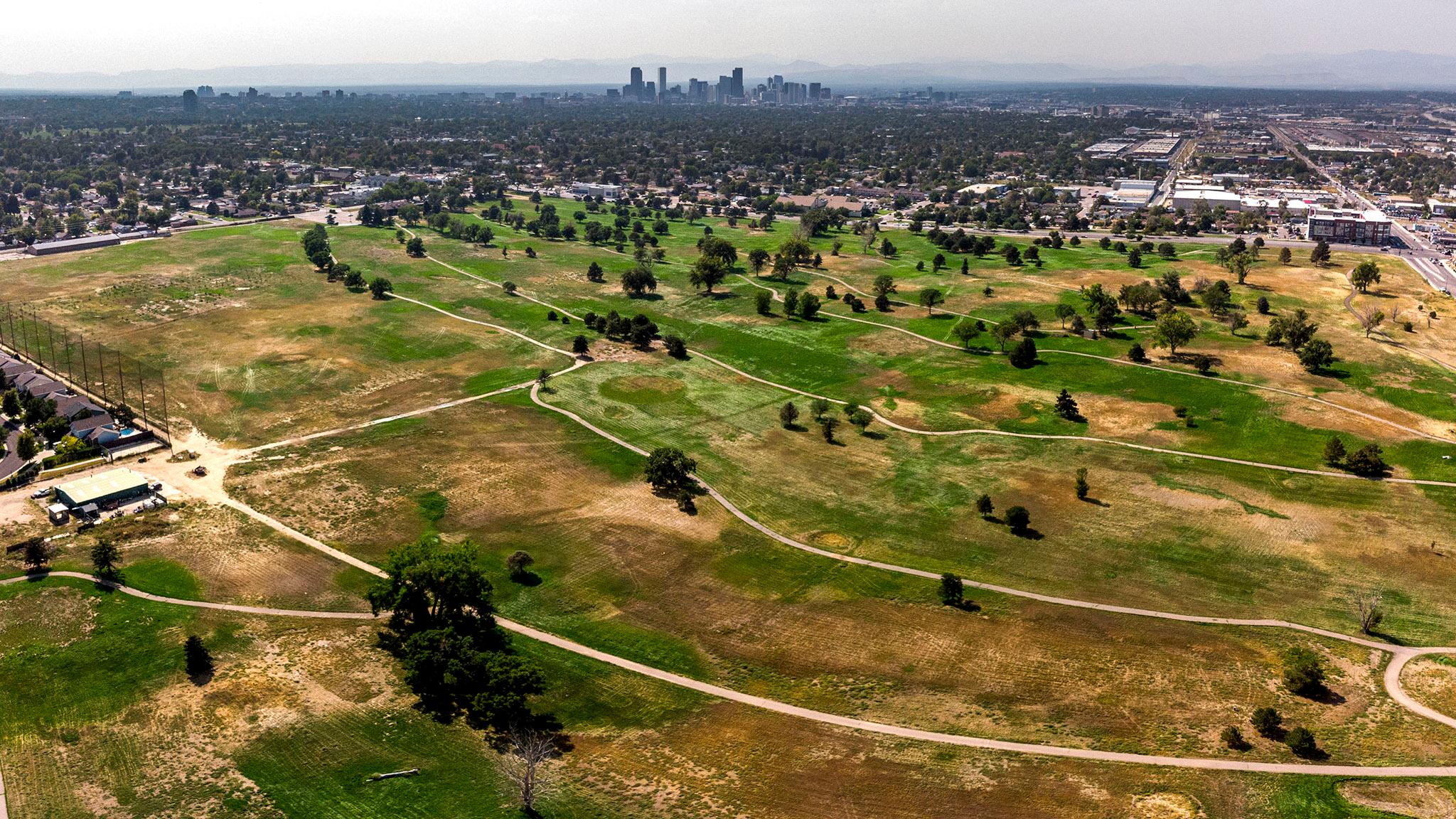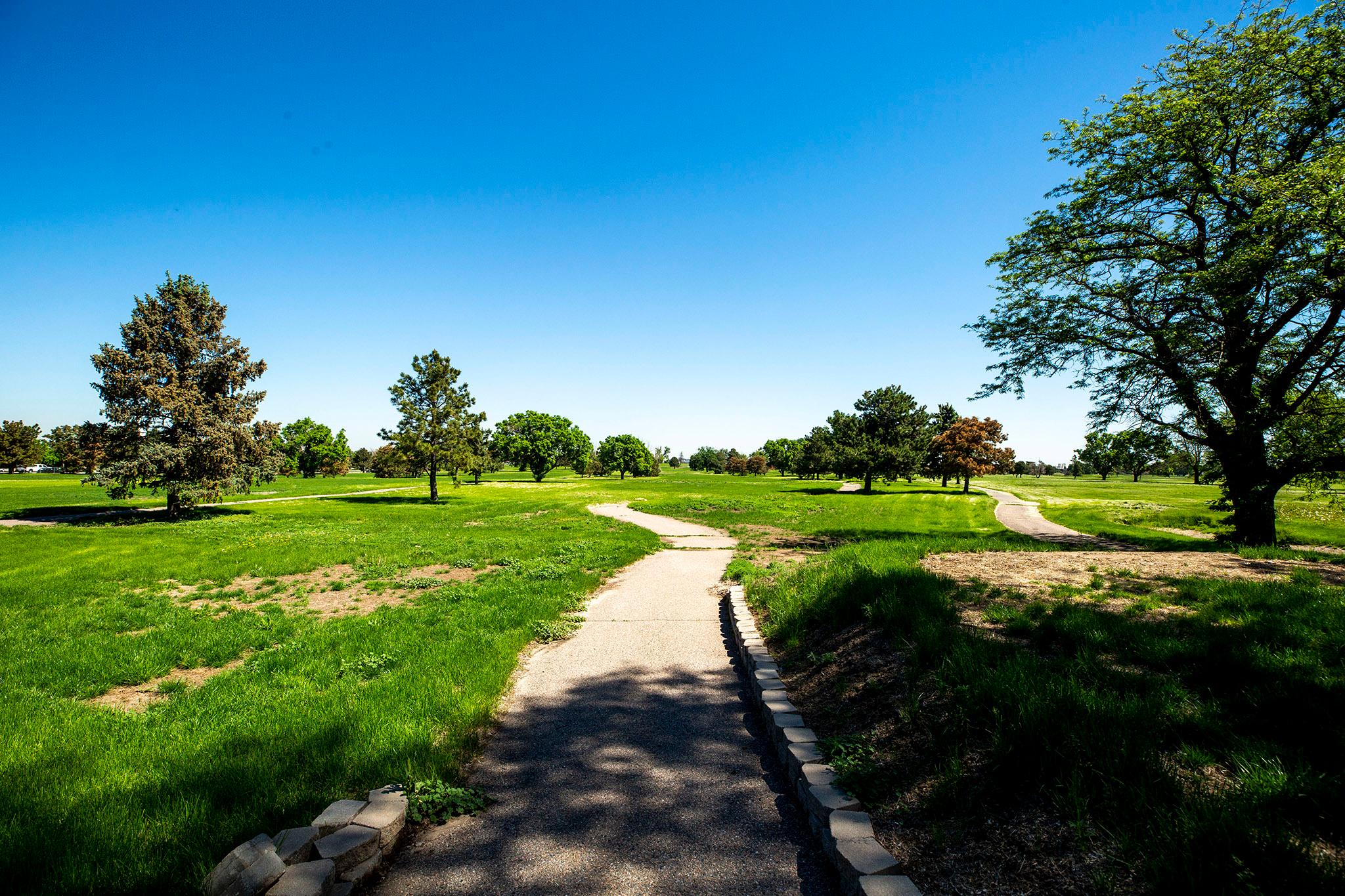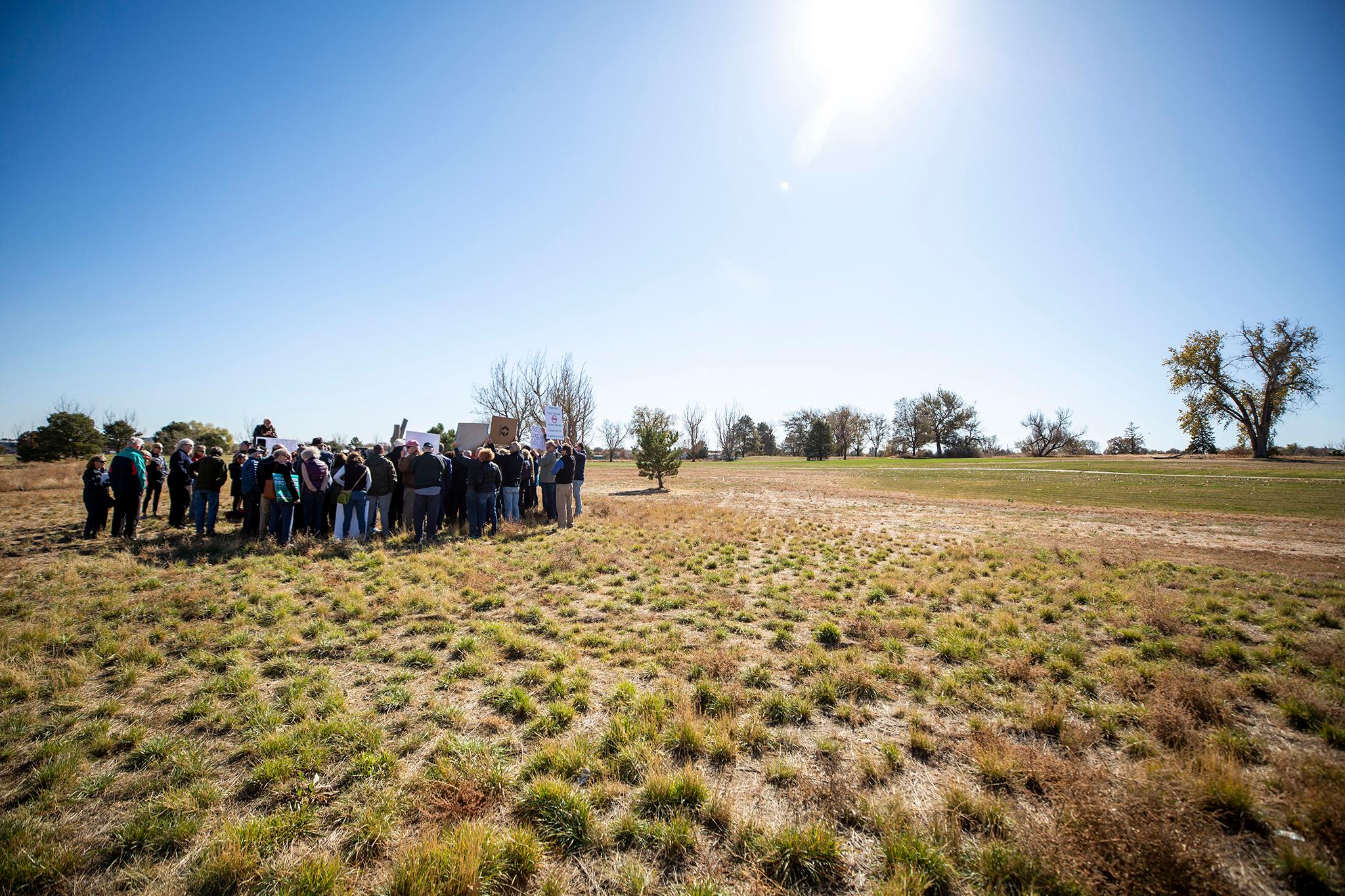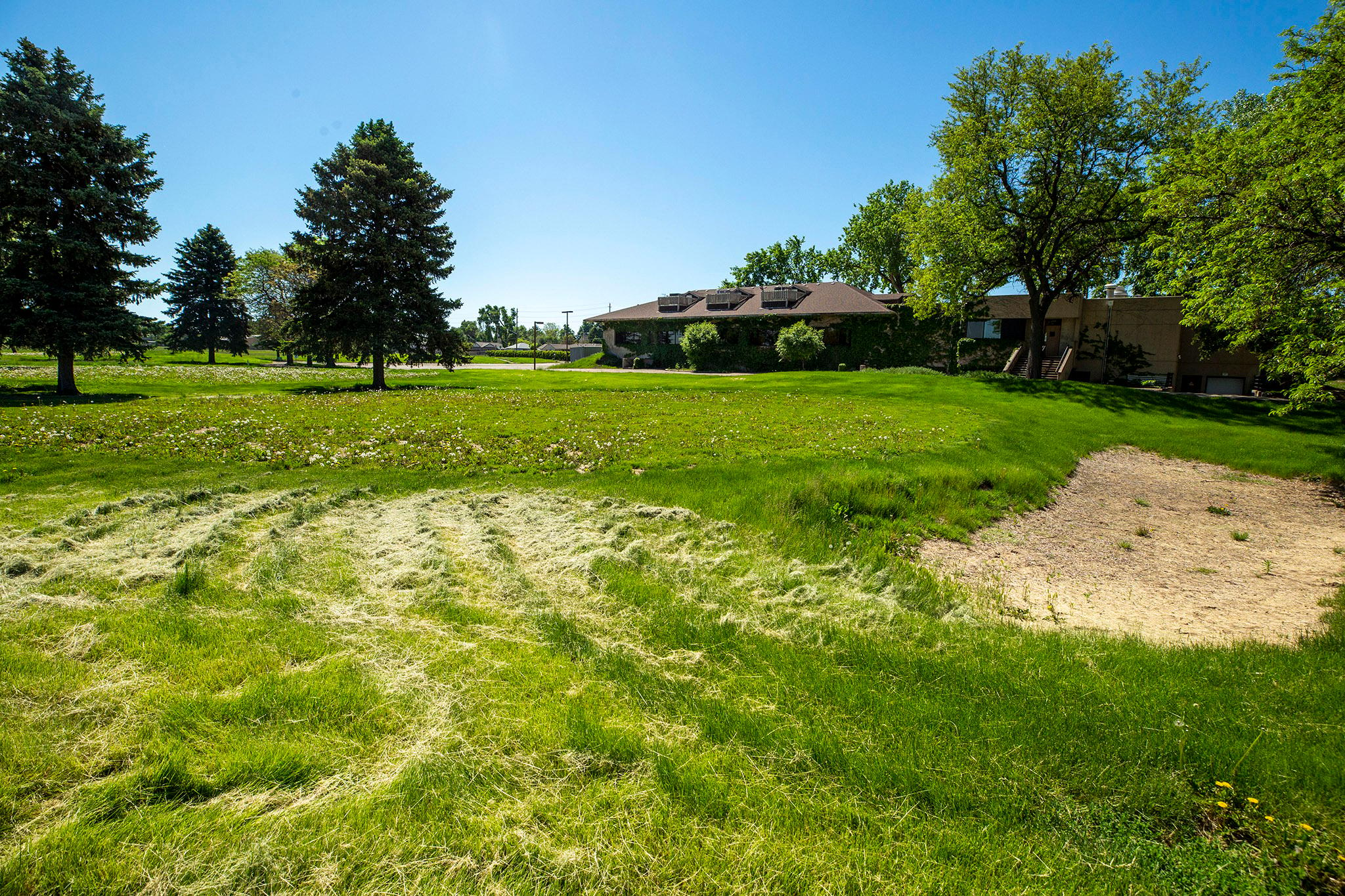Denver finally has a picture of what development company Westside Investment Partners wants to do with the Park Hill Golf Course.
Last week the developer submitted an application about the future of its 155-acre plot of land off Colorado Boulevard to Community Planning and Development. That's the next step in the city planning department's Large Development Review process.
"The LDR process is significant because it creates clear and transparent guardrails for the development process," Westside wrote in an email. "This is also the first significant milestone in transforming this privately owned former golf course into new public parks and much-needed housing."
Here's what the developer proposed in the application.
Westside plans to donate over 100 acres of land to the city for parks. The main park would be adjacent to the houses and industrial buildings on the east side of the course. If approved, Denver Parks and Recreation would have the opportunity to create the city's fourth largest public park on the site. Much of that land is taken up by a retention pond, which would need to be incorporated into the design.
On the west side of the park, the development would be divided into three sections: transit-oriented development, housing and commercial uses on the north; a new Main Street, shops and housing in the center; and transitional housing, a community center (maybe a library or rec center), and a market or grocery space on the south.
The 303 ArtWay Heritage Trail would cut through the site, creating a path between the 40th and Colorado A Line stop to the rest of Northeast Park Hill.
Westside would build hundreds of income-restricted for-sale and rental units -- promising more than the city requires through its recently passed Expanding Housing Affordability plan. Building more than the required number isn't necessarily altruistic; such builds come with developer-friendly perks, like fewer parking requirements per unit, expedited permitting and more.

Westside promises "tastefully designed" residential and retail space, healthy food and shopping options in a walkable neighborhood that prioritizes people and experiences over cars. There will also be programs to minimize displacement in the area; though, details are not fully spelled out in the applications.
Eventually, the public will have the chance to vote on whether the city should lift the conservation easement, and City Council will have multiple opportunities to vote on various aspects of the project. It's unlikely the future of the Park Hill Golf Course will be decided by voters in the November election, developer Kenneth Ho told the Denver Post.
Even if city officials support the plan, the development is far from guaranteed.
The site, which has been out of commission since 2018, is protected as a golf course by a voter-approved conservation easement.
Lifting the conservation easement for commercial or residential development would require a majority of Denver voters to undo what they approved in the '90s.
In November 2021, voters passed an initiative to ensure they -- not city officials -- could decide when to terminate a conservation easement. Opponents of the development of the Park Hill Golf Course funded and ran that campaign. A competing measure funded by Westside, to undermine that initiative through a specific legal interpretation of state conservation-easement law, was voted down.
Open space proponents interpreted the vote as an endorsement that the public did not want the golf course to be turned into apartment and condo buildings and retail.
Despite that uncertainty, the city and developers have moved forward with the assumption that they will be able to develop the property.
For years, the future of the golf course has been a heated topic of debate.
Some residents want the land to reopen as a golf course. Others want the entire plot to be turned into a massive park. Still, others want to see amenities like grocery stores or markets, housing, commercial space and more -- similar to what Westside is proposing.
It's not just neighbors who are interested in the golf course's future. The site has also attracted the interest of political heavyweights like former Mayor Wellington Webb, civil rights attorney Lisa Calderon and former lawmaker Penfield Tate III who have argued it should be turned into a park and that the public engagement process has been flawed.
"As the City and the developer continue with their sham process to fleece citizens into believing that mixed-use development is the only option, we went to work, taking the comments from the City's own survey to provide people with a possible vision for that land," said Penfield Tate, a spokesman for YES for Parks and Open Space, in a statement. "We've seen what CPD has put out and called a 'prevailing vision' - it's a 'prevailing development vision' and people should not be fooled by it. They voted against it. Soundly."
That group hired landscape architect Edward Shalkey to incorporate public feedback into an alternate design for a park that does not have city backing.
Westside and Community Planning and Development say they have invested in community outreach with the neighbors.
The city and Westside say the plan has been 18 months in the works.
"The draft recommendations began with the vision that hundreds of community members contributed to in 2021 and were crafted through work done in 2022 with the community steering committee, community navigators, and the public," said Denver Community Planning and Development in an email.
According to the city, the community's ideas were as follows:
- Create a new, large park and community gathering places
- Stand up an oversight committee to guide future planning and development
- Preserve and expand the tree canopy to combat urban heat island effects in this area
- Add youth and recreational sports opportunities
- Include a variety of affordable (income-restricted) housing options, including for-sale units
- Address food insecurity by including space for grocery and fresh food choices
- Create space for local businesses and businesses owned by people of color
- Employ strategies to mitigate involuntary displacement
"By a 10:1 margin, the surrounding community supports transforming this privately owned golf course into new public parks and housing," wrote Westside, citing a December survey.
Here is what people who live nearby think about the plan.
Longtime resident Joey Lucero, whose home buttresses the park, told Denverite he doesn't like the plan.
"It blocks the view here. We want to have a park or something. That would be even better, if possible. I would agree on that. We want to see the mountains," Lucero said. "Right here, if they get a development of apartments and stuff, we won't be able to see back there. We'll only be able to see buildings. Who wants to look out and see buildings?"
He would like to see a baseball diamond and other play spaces for youth.
And if development is inevitable, "I think maybe a grocery store or something wouldn't be such a bad idea," he added. "It'd be a good idea to have a little shopping center because we have to go all the way to King Soopers over there just to get good groceries and stuff. And otherwise, we have to go to these little 7-Elevens and stuff like that, and everything's more expensive. But you know, if we have a little shopping center right there, it would save people a lot of time, a lot of money."
And he can even see why adding more housing has an appeal, considering the population boom over the past decade in Denver.

"Housing might be good, only because there's more people that need a place to stay," he said. "And there's probably more people that need a place to rent and have somewhere to call home."
Dylan Raye-Leonard moved to the neighborhood four months ago from North Carolina and learned a bit about the development debate when he first moved in but hasn't heard much since.
"I'm personally always a parks kind of guy, so like, I think the affordable housing is a good idea. Market rate housing? I'm sure they have their reasons," he said. "Some signs around here say like, 'You don't really get it back. It's only green space once.'"
Raye-Leonard would prefer the city to preserve the entire land as a park and is glad some of it will stay that way, though he's still uncertain about the process.
Pam Washington runs a fresh-food pantry on the Dahlia Campus and said she participated in conversations about the course with the Greater Park Hill Community, INC. She has strong feelings about the future of the space.
"We need to preserve our green space for environmental reasons," she said. "Our air quality is terrible over here because of the highway. A lot of this is an industrial area as well. So any development should be beneficial to the whole community. If anything goes up, it should be sustainable."
She said she's disturbed the developer cut down trees and is skeptical about the quality of the park since much of it will be a retention pond. But she supports some types of development.
"Things like an outdoor market space, another huge garden space, an amphitheater, you know, all these things can be combined where it's public use," she said. "It still can be used as a golf course on a smaller scale, you know, and just rebrand. But it still needs to be beneficial for the community in the future of this neighborhood."
When it comes to promises of affordable housing, Washington is skeptical that the units would go to those who need it the most. Other income-restricted affordable housing projects offer rents that are higher than her mortgage.
"Low-income housing shouldn't be comparable to my mortgage," she said. "That's not low-income housing."

Her friend, Elwood Johnson, who lives in Whittier, has watched affordable housing projects be built on Welton Street. Those homes, he said, are unaffordable to low-income people and won't be until they fall apart.
Having witnessed longstanding histories of racist redlining pricing out Denver's Black communities -- including Northeast Park Hill -- and massive displacement, neither Johnson nor Washington trust the intentions of Westside or promises of affordability.
While some residents have advocated for a grocery store, Washington wants assurances that the business owners are from Colorado and the African American community. She said for her, the community meetings with developers were a waste of time because there weren't many choices.
"If you're giving us the set of tools to play with, then we're not really creating anything," Washington said. "Because you're giving us the things to create with. The options were limited so you can only have a certain outcome... That's just manipulation."
Correction: An earlier version of this story stated that turning the golf course into a city-owned park would require a public vote, based on a recently passed ballot initiative. That is incorrect. A vote is only required in cases of commercial and residential development. We regret the error.











